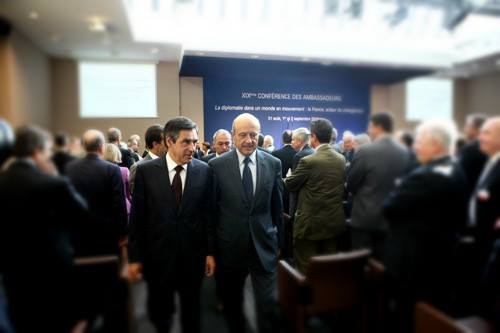Thursday night marked the final Republican primary debate before Sunday’s vote. Former Prime Minister François Fillon and Mayor of Bordeaux Alain Juppé qualified for the knockout-round in the first round vote last week. Juppé and Fillon do not only represent two types of charismatic leaders, they lay out two different visions of French conservatism.
Many pollsters and political commentators are hiding their embarrassment of their own false predictions of last weeks primary vote by focusing solely on the ongoing showdown for the Republican nomination. Yet, let’s not forget that a former president, Nicolas Sarkozy, did not even make it to the second round of the primary of his own party. All the experts had predicted the knockout-round to be Juppé vs. Sarkozy, two like-minded Republicans whose differences merely cristallise in the disdain for each other personally (as do their own supporters).
With the stunning upset of Fillon’s qualification to the second round, a new battleground has opened up, a cliff between two conservative streams, that will only be visible for this week, until the vote on Sunday will have all Republicans fall behind the nominee. This divide became visible in Thursday’s debate.
The debate on the French state-broadcaster France 2 started off very amicably: Juppé and Fillon seemed like esteemed gentlemen, without any disagreements: both agreed that the political class needs to stop giving in to the powerful trade unions, that government needs to be transparent and that indictments need to resolve in resignations (even though Juppé did not do that when he was involved in his own political scandal in the 1990s under president Chirac) and even that the total number of parliamentarians needs to be drastically reduced.
After this buddy-like kickoff, Fillon’s and Juppé’s differences became crystal clear: Fillon is a social conservative, yet running on fiscal conservatism, and Juppé a centre-right Europhile running on his De Gaulle-like charisma.
These two worlds first came clashing on labour policy, as François Fillon is a proponent of easing up procedures for firing employees: “We don’t help employees by making labour regulation too stiff. This very policy has lead us to a situation in which companies don’t settle in France to begin with“, asserted Fillon. Fillon also wants to get rid of the 35-hour working week that has hampered the French economy, and let employees negotiate working hour contracts again. Juppé replied that “making it easier to fire employees doesn’t ease employment“, and also seemed shy on his own campaign proposal to increase working hours for public sector employees.
Fillon voiced his criticism on Juppé over his failure to stand up for radical changes. François Fillon seems almost eager to clash with both the trade unions and the public sector, out of which he intends to cut 500,000 jobs. His tax plan intends to considerable reduce corporate income tax, all while delaying lowering income tax for households to “as soon as the economy is back on track again“. Juppé and Fillon agreed on increasing sales tax and abolishing the socialist government’s solidarity tax on wealth.
The difference in tone which was already apparent during the debate on fiscal and labour policy, became even more apparent when François Fillon voiced his opposition to multiculturalism and the “ideological indoctrination of public school history lessons”. Fillon famously wants to reform history lessons nationally, namely to teach that the French colonisations were there to merely “spread the culture”, playing down the horrors of the French 19th century settlements. In fact, Fillon expresses little reservation towards manifesting his social conservatism and nativist inspirations.
On foreign policy, Alain Juppé seemingly supports the status quo when it comes to Syria. In fact, his appreciation for the European Union, which he continuously marks as his selling argument against the far-right, leaves him no space for an appeasement with Russia. Juppé interrogated Fillon on his friendly personal relationship with Vladimir Putin, which has been on French news for the entire week. Indeed the foreign policy differences are visible: a rare find in French politics, as interventionism is usually a negotiation with European partners, not a doctrine. Fillon opposes the imposed trade sanctions on Russia and sees deepened diplomatic relations as a way to stop the terror-regime of Assad in Syria. Juppé on the other hand stayed vague on his proposals, seeming more like a wise leader that will make “France respectable again on the international stage“. For Juppé, France first needs to refind its confidence vis-à-vis of the Germans before it can reach beyond.
So this is it. The French right couldn’t be more split on Sunday’s vote, between Juppé’s establishment EU-proning gaullisme and Fillon’s social conservatism mixed with an opposition to unions and a bloated public sector. The open primary is highly unpredictable. Fillon’s large victory last Sunday could be without effect this weekend, depending on which voters make their way to the polls. Only 63% of the voters in the first round of the primary were Republicans or centre-right voters.
This way it seems ironically, that the biggest divide in French conservatism in decades will be resolved by the electorate of the French left. 2016 will continue to surprise us.





